A Quaker in Beirut, Lebanon_ Interview with Friend Tony Manasseh · Philadelphia Yearly Meeting
Thursday, 18 March 2021
Share this article:
To download the article click HERE, or visit the PYM site.
A Quaker in Beirut, Lebanon: Interview with Friend Tony Manasseh
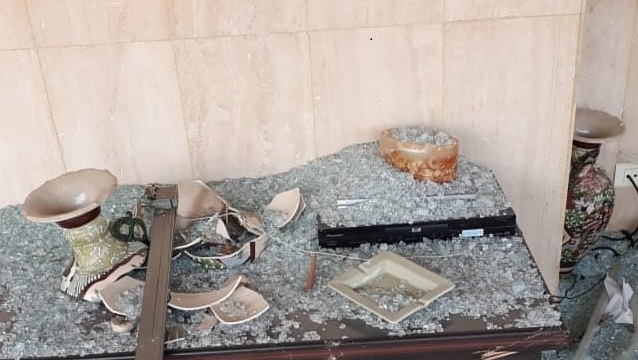
Tony Manasseh (Central Philadelphia Monthly Meeting) is a third-generation Quaker who grew up in a country that used to be referred to as “the Switzerland of the Middle East.” His home city, Beirut, was a financial engine that powered the region, and the country had a multicultural vibe that drew international investment. In the 1960’s it was also a place that brought the different cultures of the region into close proximity, building relationships centered in common interests that embraced diversity and supported a distinctive Middle Eastern culture.
Since then civil war, political change, economic distress, and Covid have been tough on the region. The aftermath of a devastating ammonium nitrate blast that tore facades off buildings and blew apart a large swath of homes overlooking the waterfront made everything worse. According to the World Bank the blast caused between $3.8 and $4.6 Billion dollars of damage.
Since then the economy has been mostly in freefall.
As a young man, Tony watched his father’s generation work to grow and support Quaker institutions in Lebanon. As an adult, Tony soon joined them in this work and became an interested Quaker. Today, although retired, Tony works pretty much full time on Quaker-related issues; it is faith that grounds and motivates his life. An interview follows.
Many Friends do not realize that Quakerism went through a period of active and sustained international outreach in the late 19th and early 20th century. This touched many corners of the world, but in the Middle East in particular it built two Quaker schools; Brummana High School and Ramallah Friends School.
One was sponsored by British Friends; the other by American Friends. Both of these schools ended up educating generations of intellectuals and political leaders in the Middle East. Why was that?
Yes, Beirut being at that time the gate to the Middle East saw an influx of missionaries after the 1860 Druze-Christian massacres.
Among the first Evangelists were Sybil & Eli Jones (aunt and uncle of Rufus Jones). They visited the area, landing in Beirut where at a certain Bassoul Hotel, all missionaries gathered and had their initial meetings in a collaborative way. They sort of divided the work amongst each other without any prejudices.
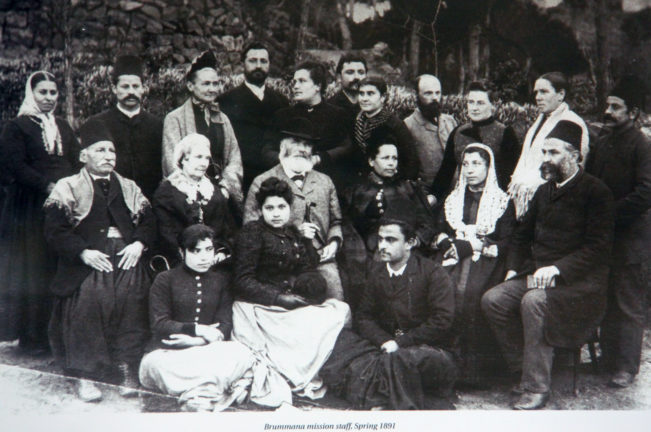
Sybil and Eli Jones met a Swiss Catholic missionary, Theophilus Waldmeier, who had just escaped with his family the massacres in Ethiopia. Sybil and Eli convinced him of the ‘Quaker way’ and he accepted their challenge to start a school in the distant rural mountains, Brummana.
Fundraising was done in the UK and the US and Brummana High School started with the support of some 15-20 expats who came to help in the start.
There was a sizeable Meeting for Worship that was soon joined by locals.
How did your family intersect with the founding of Quaker institutions that emerged during this period?
In 1877 my grand uncle Beshara Manasseh who had finished his MD at the American University of Beirut (Founded by a Presbyterian missionary in 1866) was asked by T. Waldmeier to start a medical facility at the school. So, an old silk factory on the property was converted to a makeshift hospital and it became the only hospital serving a very wide area in the mountains. That went on till 1929 when my other grand uncle Dr. Antonios Manasseh raised funds to have a new modern hospital built.
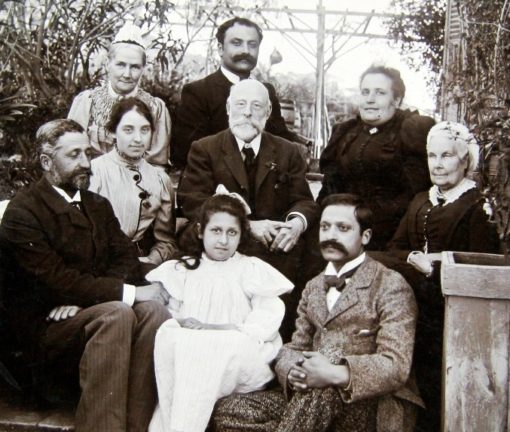
The school and hospital became a focal point for other missionaries who started many other schools all over the country. That hospital closed in 1943 during WW2.
Quakers also started the first orphanage (about 300 pupils) in 1929 in another village, Ras el Maten, under the leadership of Daniel & Emily Oliver of Scotland. This one also closed in the 1960s for lack of funds to rebuild after a minor earthquake.
In 1915 Quakers started the first mental asylum (Asfuriyeh) just outside Beirut and it was the first of its kind in the Middle East. This one also closed for lack of funds and was given to the government which sold it as real-estate in 1974.
In 1910 Dr. Beshara Manasseh started a tuberculosis hospital just below Brummana. This one is still working as a general hospital in joint leadership of private and public sectors.
Many other small schools were also opened for specific periods in neighboring villages in the late 1800s to encourage families to educate their children.
What was the Quaker Faith’s impact on Beirut and how does that endure?
All that activity of good work, service, philanthropy put Quakers on a high pedestal.
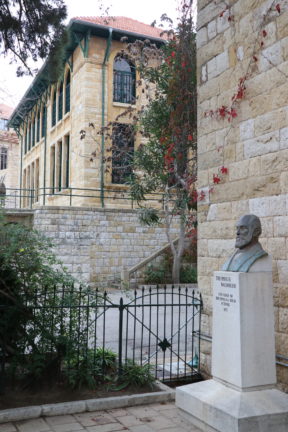
The school, which is now the only remaining Quaker institution, had attracted many people from the Pan Arab area in the 1950s till recently to educate their children. This was a blessing to East-West relations because many of today’s Arab leaders had been educated at our school which gave them the culture and way of life of the West. This undoubtedly has produced tolerant brands of religion. The diversity this school offered had a pioneering effect on the area. American University Beirut has done the same thing.
Ramallah Friends School played a similar role in its environs serving mainly the Palestinian population thus improving their prospects for a better life under very harsh occupation situations. This has made the Ramallah school, like the Brummana High School, the educational minaret for any family aspiring to arm their children with useful tools for life rather than war machines.
The Brummana & Ramallah Meetings flourished with their schools and their services to their communities. We had very successful Yearly Meetings together (Middle East Yearly Meeting) till the 1967 war when communications stopped due to occupation and the war situation in the area.
All of a sudden, our two countries became enemies while we were still Friends.
In 1992, with the help of the late Landrum Bolling, Friends United Meeting (FUM), and Quaker Peace & Social Witness (QPSW), we gathered in neutral Cyprus for the first time since 1967. It was a very touching event after so long. We repeated that in 1994 at the Brummana High School and in 1996 in Amman/Jordan and that was it.
We occasionally meet in the US when we happen to be here at the same time.
Most of the time, you live with a foot on two continents, and participate in in two very different cities; as a Christian and a Quaker does that result in a heart divided or a soul more acclimated to God’s light in many different places?
This is a tough one…I will try not to be emotional…It is very hard to live in two so different cultures. One culture is that of anger, war, poverty, absence of government services, corruption, illicit businesses with occasional happiness and détente.
The other culture is that of here in the US, that of services, abundance, cleanliness of thought and spirit, jobs, prospects for better lives and hope, albeit some misgivings that appear minor for a person coming from the Middle East. The US is the dream place to be for many, many, people seeking peace and a better life.
I am not lost and I’ve adapted to those two cultures.
Because of the nature of what I did (Marketing and Finance) and what I do now (mainly Quaker work), and because of my upbringing, the three languages I speak, and having lived in 11 countries in my working life, I have always been translating the East to Westerners and translating the West to Middle Easterners.
It is difficult and I am so often misunderstood as believing what I am actually translating, when I would really be just explaining. This is exhausting to say the least. There is also the language issue…sometimes I am thinking in Arabic but explaining in English or vice versa.
Although I am not lost between the two cultures and I understand both very well, I still sometimes feel that I am without a real identity. I am not upset about that, but I consider it a blessing that I am a citizen of the world.
Describe your father and his Quaker cohort. What were they like then? What is the Meeting in Beirut like today?
I was born as a third generation Quaker.
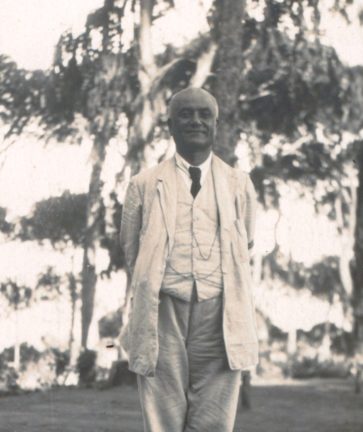
My father was a physician who practiced medical philanthropy as did his father and uncles. They were all Quakers to the core: the old-style conservative Friends who preached alongside their practice.
They were highly respected in the community and we enjoyed many privileges that came with their medical profession and good reputation. They did pioneering medical work (that was) documented in the Lancet and British Medical Journal and some Quaker books.
My mother came from a Greek Orthodox family, so I have the influence of both in me with a clear strong tilt to Quakerism.
I also enjoy the Presbyterian church. I also examined Islam in my early spiritual search. In my early adulthood I revolted against my father’s puritan ways, but I always came back convinced of his way.
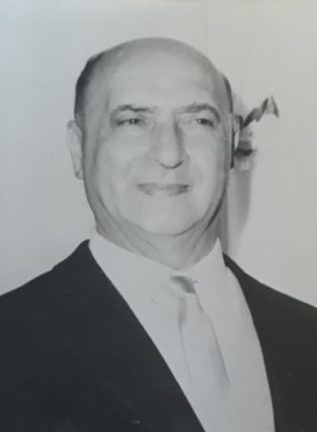
By the model of my ancestors, I was led to study medicine which I was not able to finish because of my early interest in politics and public service at large. I am not sure I have succeeded in that either. At 70, I keep trying.
Who continues to steward the faith in Beirut during these very challenging times?
As Quakers in the Middle East (with Ramallah & Brummana Friends Schools) our community’s numbers never exceeded 60-70 at best in the 60s. Now those remaining there, full time, are not more than 30.
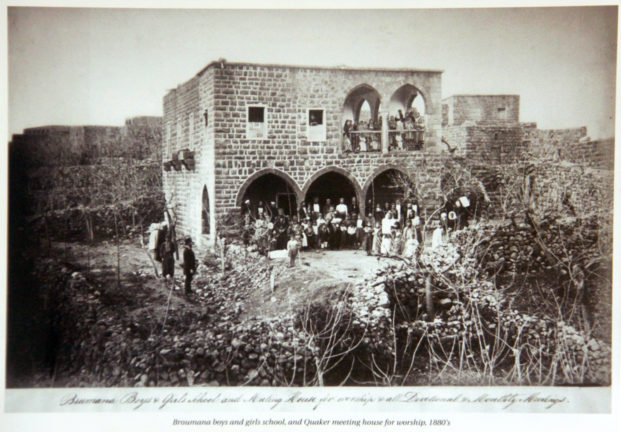
The Brummana Meeting for Worship on a good Sunday has three-to-five people present. Quite often one or none. Most of the younger ones are abroad studying, working or starting new families. So few in number! It is the schools and the previous works (above) that gave Quakers a name. But this name is fading away rapidly due to the deteriorating living conditions and the families’ pursuit of the vital necessities of life.
You see, when you are in dire conditions you don’t think of morality, peace, or justice. In such situations people splinter into the different political factions and take harsh sides. They cannot be blamed for that when the general condition in the country is that of war and hostility. Quakers are a minutely small group of (mostly) 30 older ones amongst 6.5 million people in the country.
Brummana High School is now about to celebrate its 150 years. What is the impact of the school on Beirut and Lebanon?
Without the school, the Quaker name will disappear very quickly. Our alumni network, which is called the Old Scholars Association (OSA), is a widespread intercontinental body of mostly successful people in most fields. They adore their school and do yearly reunions.
In the last 2 years much has disappeared completely because of the pitiful situation Lebanon is in. As for helping the school in this time of great need, OSA resources are cut to minimum. Their aid is mainly going to distressed families remaining in Lebanon.
The OSA, mostly of Moslem and other Christian faiths, are the ones that have carried the Quaker banner all over their communities in the East and West. Faith in the Middle East in rooted in rituals, ideology and networking. Even other Protestant faiths did not gather many adherers for the same reasons.
It is sometimes dangerous to be a Christian in the Middle East. How has that affected you, and your family? Are there any particular Quaker wisdoms that feel helpful as you witness conflict in an increasingly divided world?
I was never really afraid as a Christian in the Middle East although many other Christians do feel the danger and have this fear. As a result the number of Christians in the Middle East are dwindling very fast. This underlying fear made me bring my family to the US.
In Iraq 70% of Christians have already left. Similar trends exist in many other Arab countries. All that may be attributed, not to imminent fear, but in pursuit of a safer and better life away from war and corruption. The Middle East has unfortunately turned more towards war and ignorance.
There are areas of the Middle East where Christians have been attacked or annihilated, like in parts of Iraq and Syria. Lebanon is still safe in this respect.
The fear is that things happen so quickly and suddenly in that part of the world. So yes, the fear is in many people’s minds.
I was told so many times by Westerners:
What are people like you Quakers doing in a place like this…and I would reply, I will remain there as long as there are people who accept our way of thinking and as long as our school can enlighten minds.
You see, the Middle East is the birthplace of the three Ibrahimic religions and is therefore on the frontlines of the confrontation between them. Each has been fighting for more land, dominance, and dogma.
In the 1940s and 50’s the area was seeing a huge boom in development, education, and business.
As of the 1967 Arab-Israeli war, the area fell as part of the push and pull of the cold war, and the East – West conflict. That wasn’t yet catastrophic. But in retrospect we can see how the cleavages developed, and witness the mistakes made by all sides.
Whether Quakers could have done more than what we did, I am not sure. We are so few in number. We try to lead by example when we are too few to be remarked.
It is our schools and that do that for us. Through these schools we are able to increase our outreach and spread our testimonies of peace, justice and equality. Our students will always carry in them our teachings and our ways. Brummana and Ramallah are both small meetings, but they have big schools.
The schools spread the word much more than the meetings.
How has Brummana High School been coping during this pandemic year?
This is a sad situation at Brummana High School.
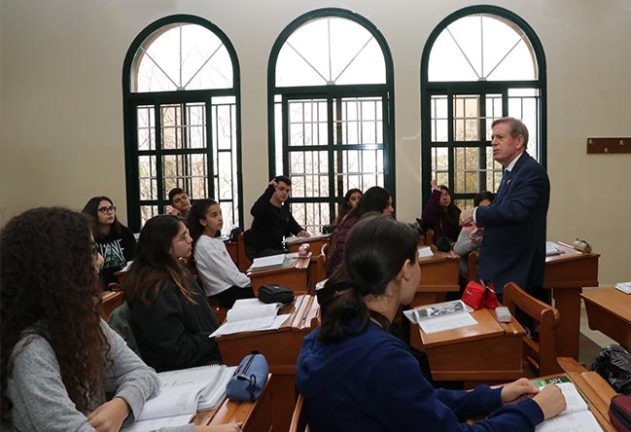
This once flourishing beacon of liberal education spreading the Quaker way since 1873 is, within one year, in total distress.
Political factions have split the country, and a regional push and pull has isolated Lebanon. The recent rampant corruption and bad governance has eaten into the economy so much that the Lebanese Lira lost 90% of its value.
A teacher who earned the equivalence of $3000/month and lived decently, now makes $300 and this loss is compounded given the astronomical hike in prices of vital goods. A student’s tuition that was $5000/year is now worth $750. Even this they cannot pay because their parents either lost their jobs or lost their savings at the banks (or both) as the banks went bankrupt lending the government.
The school’s endowment fund was deposited at the banks. There is (now) just a piece of paper worth nothing because that money is gone too.
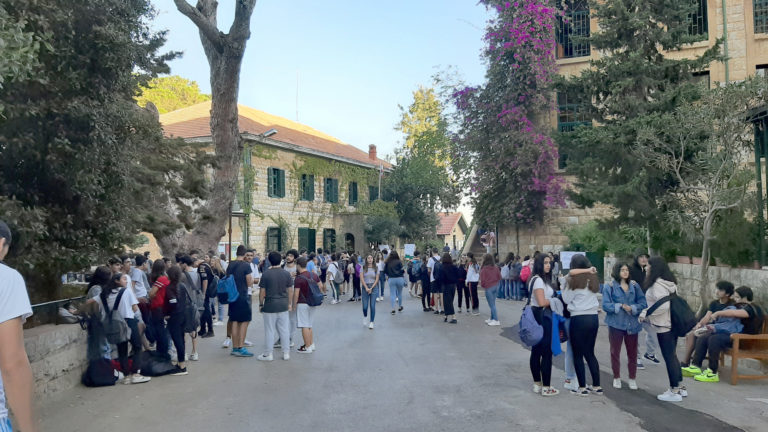
As a result, the school is now operating at a huge loss of about $1.5 million/year and without any reserves. It’s all gone.
I have been involved in the school for the past 40 years and in the direst times of the civil war, but never ever was the crisis as acute and prospectless as now.
This school has always survived many hardships all along its 145 years; the famine of 1914, WW1, WW2, the Lebanese Civil War, and many other calamitous events.
It is God’s wish that it remains there to enlighten the people and bring East and West closer.
David Gray, who currently serves as the Head of the School, was featured in an FWCC story last fall. Can you expand on some of what he said in that story?
Before the explosion occurred there was over 50% poverty and 35% unemployment in the country with terrible levels of deprivation caused by the collapse of the currency (worth only 20% of what it was worth 6 months ago) and hyperinflation in the shops. The awful explosion in Beirut on 4 August and its devastating aftermath were the last thing that the suffering Lebanese people needed. Around 350,000 people have lost their homes, at least 200 deaths and many thousands were injured.
David Gray joined BHS about 2 years ago and the school saw a huge improvement and renaissance very quickly. Numbers and figures went up like a dream.
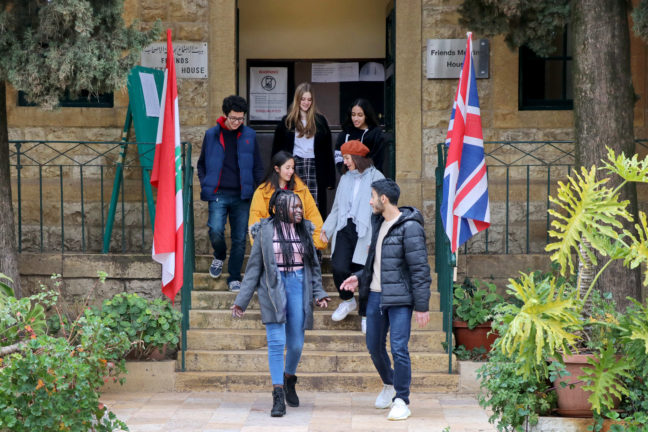
We had everything going for the school…close to perfection like we had not seen before. Then all of a sudden as is Lebanon known for, everything crumbled. It is not that we were not expecting it … we felt it coming … but we were not expecting it to be so quick and in such a magnitude.
The catastrophic explosion of the 4th of August was so damaging that its economic after-effects were even harder than the destruction. Many damaged businesses went bankrupt and therefore loss of jobs.
Many families lost their homes therefore insecurity and chaos.
The cost of the total damage estimated at $3-6 billion had an immediate effect on the exchange rate resulting in the steep fall of the Lebanese Lira to the dollar. That is not to mention the loss of lives and disabilities. A calamity had befallen on Lebanon.
Since then, the country is in morning, despair, poverty and … chaos. Much worse than what it was before the explosion.
- To learn more about the school or to help the school community, please visit the BHS website where they note that many school families are in a critical financial situation resulting from unemployment at over 50% nationwide, social and political instability, and the Covid-19 pandemic and resulting lockdowns.
- To learn more about US-based initiatives working to help Brummana High School recover, invite Tony Manasseh to visit your community to share the story of the Brummana School and why it matters. Email Tony at tonypmanasseh@yahoo.com
- Access first-person media story by Sara El-Yafi reporting on the economic situation in Beirut.
Your home suffered considerable damage in the blast, and you were both injured, and hospitalized. What was that like for you? Have these experiences tested your Faith?
My faith is never tested. I have been through a lot in my life in the Middle East.
I was kidnapped during the Civil War…
I was attacked by mobs in Tehran as I was going to Mehrabad Airport to flee with other expats when the Shah was toppled in 1979. After an agonizing 3 days at the airport I managed to get on the last plane out… with a dozen passengers sitting on the floor in the aisle.

But this explosion was a trauma of a different caliber. In Beirut I live in a residential building right opposite the port 500 yards away from the site of the explosion. I was in the breeze of a midsummer day on the balcony talking to my wife in the States when I started to see a huge plume of smoke building up over one of the hangers of the port. The field of vision was so clear as there is nothing that blocks my view over the port. That smoky fire went on featurelessly for about 40-50 minutes.
Then the skies got darker with the smoke, so I went back to the balcony to see that there were now small cracker-like bursts over the smoke but now with much higher flames in the air. I was mesmerized by the sight as I had not seen anything like it before.
Then came the explosion and a huge mushroom of smoke built up and started coming my way.
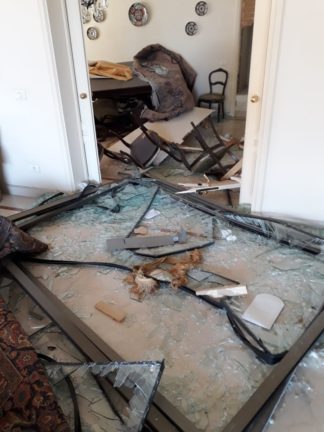
At first, I froze for a few second till I saw small homes below me being hit and destroyed by a wave of some sort. Then I started to run inside.
In a fraction of a second the wind and pressure of the explosion caught up with me and blew me forcefully inside the apartment hitting a wall, a door, and some furniture on the way.
I literally flew inside the apartment with a heavy balcony glass door pushing me. I fell on the floor but was able to stand up again and go out to the balcony and collect my laptop… it is then that I saw the enormous damage that was done. As I was going back inside, the second backward sucking wave came, and I flew hitting I don’t know what and fell on the floor. That second wave was long. I lost consciousness.
I was woken up by (the noise of) other residents of the building. I quickly stood up, hearing screams in the stairwell with people fleeing down the stairs as the elevators were blown out of their places.
Neighbors covered in blood were being carried down. It must have been about 15-20 minutes that I had missed due to my unconsciousness. I heard cries of “au secours” (“help” in French) and I recognized the voice of my neighbor. I ran down to see him next to his lifeless wife.
I tried to help but when I saw a 3-4-inch hole in her cranium, and blood oozing out. As I pumped her chest, I realized she was already dead.
We sat there weeping as the shocked people were crying in the streets below us and the stairwell flooding with neighbors fleeing.
Then our cardiologist neighbor appeared coming to check on me and we went together to other floors to see if we could help. We did a little. Then back to the apartment to check the damages. That took about 3 hours till 9pm when my wife called from the US.
I must have sounded confused or burred. So, she called the cardiologist neighbor again who must have diagnosed a head injury. So, he drove me to the hospital on flat tires cut by the broken glass on the streets.
Head CT scan, brain bleed, subdural hematoma, 9 days at the American Hospital.
Two months later hematoma resolved, no apparent sequela, I left for the US to be with my family. Seven months later, as if I had nothing…not even PTSD.
Tony’s faith is an inspiration to all…to invite him to speak to your community about the Brummana School and its impact on the Middle East, email him at tonypmanasseh@yahoo.com




